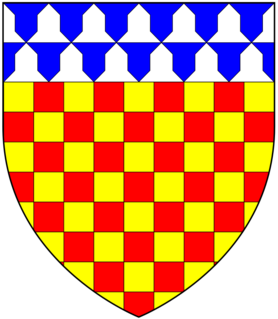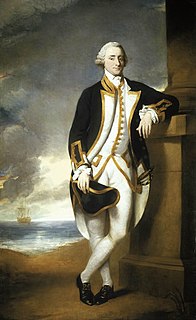
Marquess of Zetland is a title in the Peerage of the United Kingdom. It was created on 22 August 1892 for the former Lord Lieutenant of Ireland, Lawrence Dundas, 3rd Earl of Zetland. Zetland is an archaic spelling of Shetland. The Dundas family descends from the wealthy Scottish businessman and Member of Parliament, Lawrence Dundas. In 1762 he was created a Baronet, of Kerse in the County of Linlithgow, in the Baronetage of Great Britain. The title was created with remainder, failing heirs male of his own, to his brother Thomas Dundas and the heirs male of his body. He was succeeded by his son, the second Baronet. He represented Richmond and Stirling in the House of Commons and also served as Lord Lieutenant of Orkney and Shetland. In 1794 he was created Baron Dundas, of Aske in the North Riding of the County of York, in the Peerage of Great Britain. Lord Dundas notably purchased the right to the earldom of Orkney and lordship of Zetland from James Douglas, 14th Earl of Morton.

Earl of Gosford is a title in the Peerage of Ireland. It was created in 1806 for Arthur Acheson, 2nd Viscount Gosford.
Viscount Hawarden is a title in the Peerage of Ireland.

Lord Aylmer, Baron of Balrath, in the County of Meath, is a title in the Peerage of Ireland. It was created in 1718 for the naval commander Matthew Aylmer, the second son of Sir Christopher Aylmer, 1st Baronet, of Balrath. Lord Aylmer's son, the second Baron, represented Rye in the House of Commons. The latter's grandson, the fourth Baron, succeeded his kinsman as seventh Baronet, of Balrath, in 1776. The titles remain united. He was succeeded in both titles by his son, the fifth Baron. He was a general in the Army and served as Governor General of Canada from 1830 to 1835. Lord Aylmer assumed by Royal licence the additional surname of Whitworth in 1825 on the death of his uncle Charles Whitworth, 1st Earl Whitworth. On his death the titles passed to his younger brother, the sixth Baron. He was an admiral in the Royal Navy.
Baron Congleton, of Congleton in the County Palatine of Chester, is a title in the Peerage of the United Kingdom. It was created in 1841 for the Whig politician and former Secretary at War and Paymaster of the Forces Sir Henry Parnell, 4th Baronet. His eldest son, the second Baron, devoted his life to religious work and was an early member of the Plymouth Brethren. The latter was succeeded by his younger brother, the third Baron. He served in the Royal Navy and fought at the Battle of Navarino in 1827. His eldest surviving son, the fourth Baron, was a major-general in the British Army and served in the Crimean War and in the Anglo-Zulu War. The latter's eldest son, the fifth Baron, was killed in action in Ypres Salient during the First World War and was succeeded by his younger brother, the sixth Baron. As of 2015, the titles are held by the latter's grandson, the ninth Baron, who succeeded his father in 2015.

Baron Rothschild, of Tring in the County of Hertfordshire, is a title in the Peerage of the United Kingdom. It was created in 1885 for Sir Nathan Rothschild, 2nd Baronet, a member of the Rothschild banking family. He was the first Jewish member of the House of Lords not to have previously converted to Christianity. The current holder of the title is Jacob Rothschild, 4th Baron Rothschild, who inherited the title in 1990.

Sir Bryan O'Loghlen, 3rd Baronet, Australian colonial politician, was the 13th Premier of Victoria.
Sir Michael O'Loghlen, 1st Baronet was a distinguished Irish judge and politician.
William Hare, 2nd Earl of Listowel, known as Viscount Ennismore from 1827 to 1837, was an Anglo-Irish peer and Member of Parliament (MP).

There have been nine baronetcies held by people with the surname Nugent, four in the Baronetage of Ireland and five in the Baronetage of the United Kingdom. Six of the creations are extinct, while three are extant.

There have been three baronetcies created for persons with the surname Chichester, one in the Baronetage of England and two in the Baronetage of the United Kingdom. Only the 1641 creation is extant.
There have been four baronetcies created for persons with the surname Crofton, two in the Baronetage of Ireland and two in the Baronetage of the United Kingdom. As of 2014 three creations are extant.
Peers of the Realm have been associated with Australia since early in its history as a British settlement. Many peers served as governors of the Australian colonies, and in the days when the practice of appointing British governors-general was current, the great majority were peers.
There have been two baronetcies created for members of the Haggerston, later Constable Maxwell-Scott family, one in the Baronetage of England and one in the Baronetage of the United Kingdom. Only one creation is extant as of 2008. The Haggerston, later Constable Maxwell-Scott Baronetcy, of Haggerston in the County of Northumberland, was created in the Baronetage of England on 15 August 1642 for Thomas Haggerston, of Haggerton Castle, Northumberland, a loyal Royalist who served as a colonel in the army of King Charles I. The Haggerston were recusant in the 17th century and the estates were sequestered and forfeit to the Commonwealth of England in 1649 but were repurchased by the first Baronet in 1653. The line of the fourth Baronet failed on the death of the twelfth Baronet in 1972. The title reverted to the line of William Haggerston, second son of the third Baronet and younger brother of the fourth Baronet. In 1746 he inherited estates in Yorkshire from his great-uncle Sir Marmaduke Francis Constable, 4th and last Baronet, of Everingham, and assumed the surname of Constable in lieu of his patronymic. In 1758 he married Winifred, daughter of Robert Maxwell, titular sixth Earl of Nithsdale, and assumed by Royal licence the additional surname of Maxwell. Winifred was considered to be the heiress to the Scottish lordship of Herries of Terregles held by her father. Constable-Maxwell built a new house at Everingham Park on the Constable estate in Yorkshire.

General Sir Francis Seymour, 1st Baronet, (1813–1890) was a British Army officer and courtier.
The High Sheriff of Clare was a High Sheriff title. Records show that the title was in existence from at least the late 16th century, though it is not used today in the modern Republic of Ireland. The title existed within County Clare in the west of Ireland during the time of the Kingdom of Ireland and then as part of the United Kingdom of Great Britain and Ireland.

Sir Colman Michael O'Loghlen, 2nd Baronet was an Irish baronet and politician.
This is a list of lawyers who held the rank of serjeant-at-law at the Irish Bar.

The Palliser Baronetcy, of The Vache in the County of Buckingham, was a title in the Baronetage of Great Britain. It was created on 6 August 1773 for the naval commander Admiral Hugh Palliser. The title became extinct on the death of the third Baronet in 1868.
The Clare by-election of 1877 was fought on 13 August 1877. The byelection was fought due to the death of the incumbent Home Rule MP, Sir Colman O'Loghlen. It was won by the Home Rule candidate Sir Bryan O'Loghlen. The result was remarkable in that O'Loghlen did not seek the nomination and was elected without his consent. He refused to take his seat as he was Attorney-General of Victoria. This position was considered an office of profit and thus disqualified him from membership of the House of Commons. A select committee was established to consider the issue and reported in 1879. The found that this was the case and the seat was declared vacant. Some controversy remained because O'Loghlen's position was in a colony and not in the United Kingdom. A writ was moved for another by-election in 1879.










